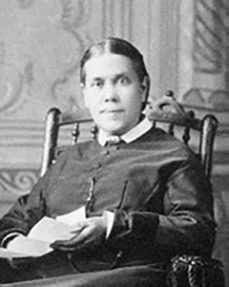Copied from the March 21, 2015 Adventist Record (page 18) which is the official news magazine of the South Pacific Division Seventh-day Adventist Church

Women preachers were rare in the 19th century. While Ellen White was well known as a powerful speaker, few contemporary Adventists would be aware that from 1878 to 1910 there were 31 other women to whom the Church provided ministerial licences. While most were on the denominational payroll, at least one, dentist Dr Margaret Caro in Napier, New Zealand, was self-supporting. The Church was small back then and women held a higher proportion of ministerial and leadership/departmental roles at the time than in the decades following.
Some of these lady pastors were particularly effective. Ellen Lane was an especially powerful preacher who drew large crowds. One Sabbath morning in Virginia her husband Elbert attracted only 35 people while the next day 650 came to hear Ellen preach. Lulu Wightman was licensed in 1898 and between 1895 and 1905 she planted 12 new churches in New York state. Then she and her husband, licensed in 1904, together raised up five more churches. In 1903, New York had 11 ministers and two Bible workers but 60 per cent of the new converts that year were won by the Wightmans and one Bible worker. Also very effective in her ministry was Jessie Weiss Curtis, whose reputation in 1927 as a preacher attracted press coverage, the reporter writing, “Coming from a radius of 20 miles, there have been as many as 110 automobile loads at a single service.” There are other notable examples that space prevents us from sharing here.
Ellen White, remembering that the first preacher to tell of a risen Christ was a woman, observed in the January 2, 1879 Review that "the refining, softening influence of Christian women is needed in the great work of preaching the truth". In 1895 she recommended the ordination of some women to deaconess-related work, a suggestion soon implemented in the Ashfield church in Sydney by Pastors Corliss and McCullagh “by prayer and the laying on of hands". Five years later this was repeated in the same church with Elder W C White officiating on that occasion.
With the numbers of women pastors increasing in the early years of the Adventist Church it was inevitable the issue of ordination for them would come up for discussion. In 1881 the following resolution was offered to the General Conference session: “That females possessing the necessary qualification . . . may be set aside by ordination to the work of the Christian ministry.” Referred to the General Conference Committee for consideration, there is no record the matter was ever addressed. However, the important thing to note is that if Ellen White believed that it was theologically wrong to ordain women to ministry she would have said so at the time—and she did not. After her death, her former assistant, CC Crisler, responded to an enquiry by writing, “This is not suggesting, much less saying, that no women are fitted for such labor (sic), and that none should ever be ordained; it is simply saying that so far as my knowledge extends, Sister White never encouraged church officials to depart from the general customs of the Church in those matters” (italics supplied).
The reality is that during her lifetime the formal ordination of women pastors to paid ministry was not a priority for Ellen White. As always, her constant focus was on the Church achieving a greater unity and a deeper spirituality.
Lester Devine is director emeritus of the Ellen G White/Adventist Research Centre at Avondale College of Higher Education.

